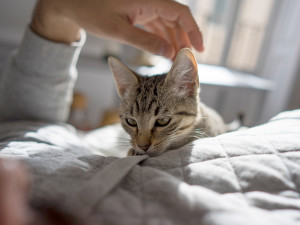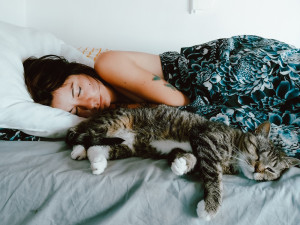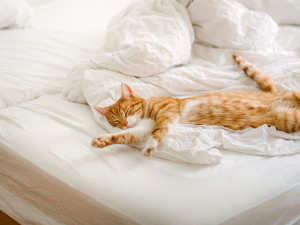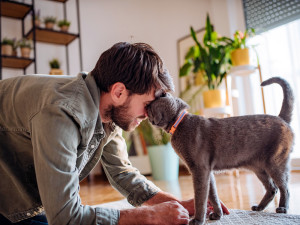
Share Article
In This Article:
Do Cats Usually Lay On Your Chest? 5 Reasons Why Your Cat Lays On Your Chest How Your Cat Laying On Your Chest Benefits Both Of You Should You Stop Your Cat From Laying On You? Why Does My Cat Lay On My Chest in the Morning? Frequently Asked Questions
Cats can sleep up to 17 hours a dayopens in new tab, so they’re always looking for a good napping spot. That might be a sofa, a windowsill, or a sunny space in the middle of the kitchen floor. Or it might be your chest when you’re just trying to relax.
As a cat parent, you love your goofy little furball, but why do they think your body is the best place to snooze?

Do cats usually lay on your chest?
Laying on your chest (or at your feet) can be a way for your cat to show affection, but it’s definitely not an unusual behavior. Whether or not your cat gets close will depend on the bond you have with them. Some cats may be slower to show affection or snuggle, while others may be eager to be near you at all times and even “make biscuits” on you.
5 reasons why your cat lays on your chest
Cats can be hard to read, but if you pay attention to your cat’s body language and learn how they express themselves, you may detect some signs of why they’re so into snuggling up with you.
Warmth
Okay, cats can be a little selfish, and they love a warm spot. Thanks to your body heat, your chest might be the ideal napping location, especially if your home is just a little too cold for their taste.
Love and affection
Your cat may show their affection by getting close to you. Because they can’t vocalize their love, laying on your chest may be a way that they show just how much they trust you and are happy with you.
Territorial behavior
Some cats can be territorial, and they may treat you as a possession. Lying on your chest leaves their scent behind, letting other animals know that you’re spoken for. Some cats may even lick you, just like a dog.
Stress relief
Cats are known for their jumpy (aka sensitive) nature, so it’s no surprise that they can easily feel stressed or anxious. If your bond with your cat is strong, they’ll likely turn to you for comfort when feeling overwhelmed, and snuggling up on your chest may be just the thing they need to feel secure.
Sound of your heart
The sound of your heartbeat can be soothing to your cat, reminding them of snuggling up to their mother and littermates as a kitten. Just as this noise can be soothing to a human infant, cats find it comforting as well.
How your cat laying on your chest benefits both of you
Cozying up with your cat can offer mental and physical health benefits for both of you and help the two of you to feel closer than ever.
Strengthens bonds
Just as physical closeness can help you feel closer to a partner, snuggling with your cat can strengthen your shared emotional bond. When the two of you spend time near each other, you’re forming a stronger, deeper relationship.
Emotional support for humans
Cats are able to sense changes in their human parents’ emotions and health, thanks to their strong sense of smell, understanding of behavior, and perception of vocal and visual cues. If you’re feeling down in the dumps, your cat can likely sense it and may climb on top of your chest to monitor your wellbeing and try to comfort you. Bonus: Their purrs can even help you both feel calmeropens in new tab and less stressed.
Heart health
Studies show that petting a cat and listening to them purr can help reduce stressopens in new tab and even lower blood pressure. A little cat snuggle time can help both you and your pet to feel more content and relaxed.
Stress reduction
A cat’s purrs and snuggles can help reduce stress, leading to a healthier life overall. Cuddling with your pet can also help with feelings of anxiety and depression.
Should you stop your cat from laying on you?
Cat snuggles are generally not a cause for concern. In fact, most pet parents are delighted when their cat curls up on their chest. But if you find it unpleasant, whether because of allergies or difficulty sleeping, consider offering your cat a comfier alternative. A plush cat bed, especially a heated one, can offer a more enticing nap spot than your chest.
Why does my cat lay on my chest in the morning?
Your cat may lay on your chest in the morning for the same reasons they do at any other time — or they may be trying to wake you as gently as possible. If you had to wait for someone to get up and make your breakfast, you might do the same.
Bottom line
If your cat curls up on your chest, you’re likely one of their favorite people, if not their very favorite. Cats tend to snuggle close to those they love and trust, whether to show affection or to seek comfort.
FAQs
What does it mean when my cat lays on my chest?
Your cat could snuggle up on your chest as a way to show affection to you and let you know that they feel safe around you.
Do cats sit on your chest and purr to heal you?
Cats are very perceptive and can often sense their human parents’ moods. They may sit on your chest and purr in an attempt to comfort you or make you feel better if you’re feeling ill or blue.
Do cats have a favorite person?
Cats often have favorite people in the house but may not be super obvious about who’s their favorite. If your cat often rubs against you, paws at you, and seems relaxed around you, you may be their favorite. What an honor!
What does it mean when your cat puts their paw on your chest?
A cat may rest their paw on your chest to show affection or to comfort you if they sense that you’re feeling sad.
References
Allen, K. “Cardiovascular Reactivity and the Presence of Pets, Friends, and Spouses: The Truth About Cats and Dogs.” Psychosomatic Medicine, vol. 64, no. 5, 1 Sept. 2002, pp. 727-739, https://doi.org/10.1097/01.psy.0000024236.11538.41opens in new tab.
Ling, Thomas. “Why Do Cats Sleep So Much? The Hidden Science of Feline Shuteye, Explained.” BBC Science Focus Magazine, 12 July 2023, www.sciencefocus.com/nature/why-do-cats-sleep-so-muchopens in new tab.
Nagasawa, Takumi, et al. “Effects of the Characteristic Temperament of Cats on the Emotions and Hemodynamic Responses of Humans.” PLoS ONE, vol. 15, no. 6, June 2020, p. E0235188. https://doi.org/10.1371/journal.pone.0234188opens in new tab.

LeeAnna Buis, CFTBS, FFCP
LeeAnna Buis has adored cats her entire life and thought she knew them inside out and sideways. But it wasn’t until she worked with a feline behavior consultant that she fully understood how incredible, complicated, and inspiring they really are. She made a career change, starting the certification process to become a behavior consultant right away. She discovered what unique, fascinating, complex creatures cats are and knew this was what she wanted to do with her life — help others on a similar journey to truly knowing, loving, and appreciating their cats.
LeeAnna earned her certification through Animal Behavior Institute, where she received the certified feline training and behavior specialist (CFTBS) designation.
Related articles
![woman with dark hair lying in bed with striped cat, both asleep]()
Should I Let My Cat Sleep With Me? Things to Consider About Having Your Cat in Bed
Here are the pros and cons of having a feline sleeping buddy.
![a red cat stretching on a bed]()
Why Is My Cat Twitching in Their Sleep?
Sure, it’s curious—but is it also concerning?
Why Does My Cat Sleep at My Feet?
Other than the fact that they love you so very much.
![Cat kneading pet parent]()
Why Does My Cat Knead Me?
Among other things, “making biscuits” is a sign of affection. We’re not crying…
![Man cuddling his gray cat.]()
Does Your Cat Think You’re Their Mom?
You love them like a child, but is the feeling mutual?
Why Does My Kitten Lick My Nose?
No complaints, but...








